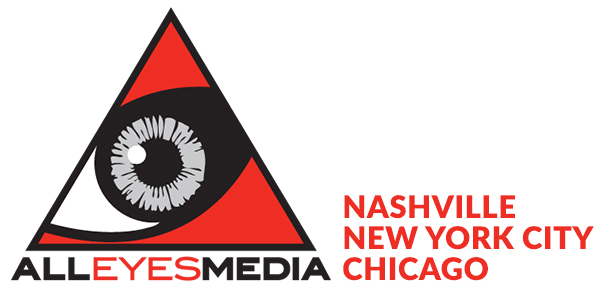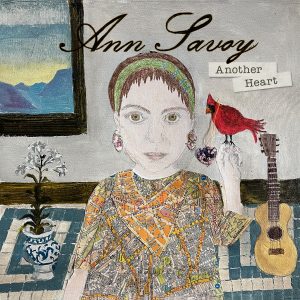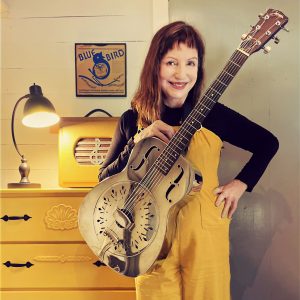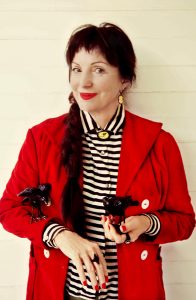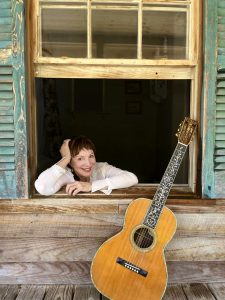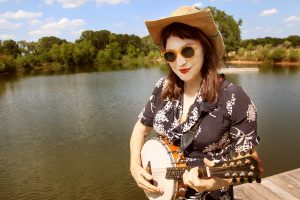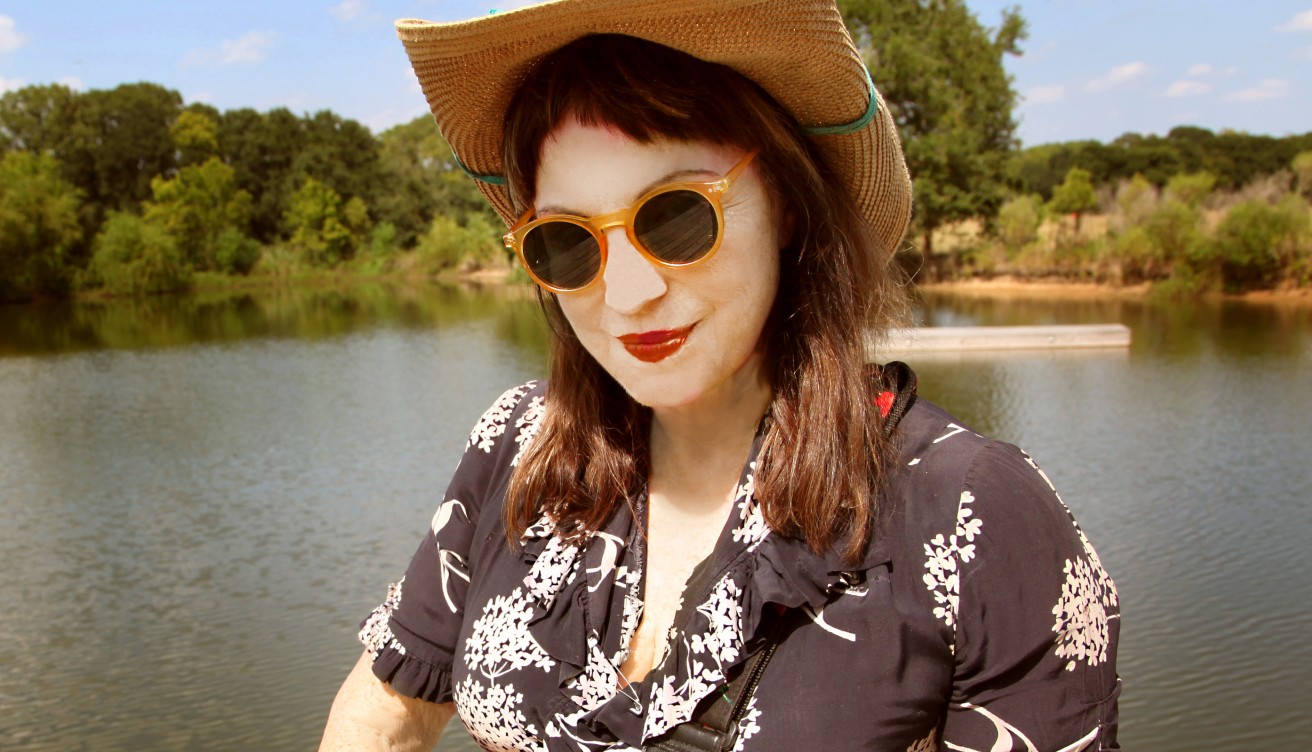
Ann Savoy
Biography
To say that Ann Savoy is excited about her new Smithsonian Folkways album Another Heart is an understatement as sweeping as the prairies of Southwestern Louisiana, where she has lived most of her life. “It’s blowing my mind to smithereens!” she says, speaking from her home in rural Eunice, a center of the vibrant Cajun and Creole cultures.
That’s the world in which she’s made her name as a leading musician and historian, digging deep into the traditions of Cajun life through more than 40 albums, thousands of concerts in dozens of countries, and definitive books telling the stories of the people. Her own stories of that life are remarkable, as she and her husband Marc — a National Heritage Fellow for both his accordion playing and for having revived the art of hand-crafted accordion making — and their children Sarah, Joel, Wilson, and Gabrielle stand as leaders in their community.
Read More Another Heart, though, tells other stories. This is the first true Ann Savoy album, the first billed solely in her name and the first to showcase the full scope of her music, from her upbringing in Richmond, Virginia, to her youthful travels to the UK and Europe, through various artistic passions and explorations that defined her life before she settled in Louisiana. She can barely contain herself. “It’s the culmination of my life, because all of the things I’ve done my whole life have been drenched in music since I was in kindergarten choirs,” she says. Produced by Dirk Powell — known for his work with Rhiannon Giddens, Cajun legacy group Balfa Toujours, and more than a decade as Joan Baez’s primary musical cohort — Another Heart is the album of Savoy’s life. It’s an imaginatively personalized cycle of both originals and songs that played key roles in her evolution, vividly capturing her experience and spirit, about who she is now and how she got there. Powell plays a wide array of instruments throughout the album, as does Joel, with other guests including Giddens, slide guitarist Sonny Landreth, and Savoy’s other three children. At the core of the album are songs by Joni Mitchell, Richard Thompson, the Kinks, Sandy Denny, Donovan, and even Bruce Springsteen — songs of longing and loneliness, of dreams and desires. Each has its own set of memories and connections for Savoy, and is a chapter in her story. Mitchell’s “Tin Angel” opened doors of sound and poetry for Savoy as a teen when her sister brought the artist’s early Clouds album. The Kinks’ “Waterloo Sunset” recalls her visits to London in her youth. These all complement and enhance the intimacy of three Savoy compositions on the album: the playfully, rollickingly intimate “Cajun Love Song” (her ode to Marc); the youthful frustration of “Gabie’s New Year’s Eve Lament” (co-written with her daughter, who wanted to bolt a Cajun celebration and head for big-city glamor); and the sorrow of “Triste Samedi (A Sad Saturday/ A Hurricane Song),” inspired by the suffering many experienced after a devastating Louisiana storm. One song by Powell and another by Carl Jones (the father of Kelli Jones, Joel’s ex-wife and still-friend, who sings with Savoy on several of the album’s selections) extend the family and community threads that tie it all together. Another Heart’s origins can be traced back to Adieu False Heart, her 2006 duet album with Linda Ronstadt. That foray into folk and folk-rock largely outside Cajun traditions earned a Grammy Award nomination for Best Traditional Folk Album. Plans had been made for a follow-up, with some songs chosen and arrangements being crafted, but when health issues robbed Ronstadt of her singing voice, the project was shelved. “One of the things Linda and I were doing was stuff we had never done before that we loved,” she says. “So I’ve been doing Cajun music, but I’m from Virginia and here’s my chance to be that person again. It was so exciting and fun just to go through that songbook that’s in my brain and think, ‘What are some of my favorites?’” That feeling stayed strong with Savoy, and became the spark that led to the new album, with several of the songs she’d worked on with Ronstadt revived and reworked. But Another Heart took its own distinct path and is far more than a sequel to Adieu False Heart, thanks in large part to Powell’s contributions.“Dirk is very out there in the best way,” she says. “He has this spirituality about him. The way he sees the world.” It certainly doesn’t sound like anything Savoy has done before. From the distorted, metallic guitar pulse that kicks off the album at the start of “Cajun Love Song” to the nature sounds (water, crickets, loons) that mark “Triste Samedi” and the ethereal atmosphere of Donovan’s “Lord of the Reedy River,” Savoy and Powell brought an almost painterly vision to these songs. And while the title Another Heart underscores the sisterly relation to Adieu False Heart, it has its own meaning. “The title was Dirk’s idea,” she says. “He meant like it’s my Virginia heart.” In her liner notes, Savoy traces her Virginia roots back to the early 1600s. “The beauty of the Piedmont and Tidewater regions of Virginia as well as the gothic depths of Richmond, Virginia, where I was raised, infused my vision with their mysteries,” she writes, “from Methodist church music to the tales of Edgar Allen Poe read to me on my screen porch by my father.”And it’s to there that she traces her attraction to songs of deep emotion. “I’ve always been drawn to the saddest, most depressing song,” she says, laughing. “I love sad music. I always have to make myself play a two-step! It’s not who I am. I’m a melancholic Virginian.” Those themes run through a lot of Cajun music, of course, as well as the music of Appalachia, coming as it does from the experiences and perspectives of the ancestors from France and the British Isles.“I guess that’s why I like the older ballads, the sad Cajun songs,” she says. “I like to hear about those emotions.” “A Heart Needs a Home” in many ways sets the tone. “You know that whole feeling where you had a period where you were alone and it’s like you were looking for somebody to fill that horrible void,” Savoy says of the song, written by Thompson, who had been at the forefront of the English folk-rock movement with Fairport Convention and years later became friends with the Savoys. “It’s such a common folk-song theme. I think it rings true to all of us.” It’s one of the songs resurrected from the planned second album with Ronstadt. Originally a duet between Richard Thompson and his then-wife Linda Thompson, here it features Kelli Jones in harmony with Savoy. Springsteen’s “Stolen Car,” a song of the deep despair of a broken heart, was also intended for the second Savoy-Ronstadt album. Giddens takes the harmony part now, also with Ronstadt’s blessing. And Savoy’s own “Triste Samedi” links her two homes. The lyrics were inspired by the widespread collective devastation from Louisiana’s many storms, with music drawn from old Virginia mountain songs. The Kinks’ “Waterloo Sunset” is one of the album’s centerpieces, its narrator sitting at home, alone, looking out at the world, stewing in the space between melancholy and contentment. It’s a classic introvert’s anthem, one of Kinks singer-songwriter Ray Davies’ most moving compositions, a gorgeous song, tinged with melancholy yet basking in the glow of that setting sun — “As long as I gaze on Waterloo sunset, I am in paradise.” Her home, now, comes through in the arrangement, which features Acadiana-evoking fiddle and accordion played by son Joel and Powell, respectively. “Isn’t that cool?” she says. “Dirk liked to season the songs with Louisiana instruments. He would throw in a little, often you won’t even hear it. It might be 11 layers under, but there’s an accordion drone on a lot of the songs.” Opener “Cajun Love Song,” with that almost alien metal pulse, is a portal through which we can go to join her, an invitation to come with her on this trip through her whole life. With it she celebrates the sum of that life, the place she calls home, the family and community she has built, before following the threads, the connectors of her past and her present, her life of Cajun love and her childhood absorbed in music. At Another Heart’s close, she returns to the present on the perfect note of the beloved “Who Knows Where the Time Goes?” written by Sandy Denny, a band-mate of Richard Thompson’s in Fairport Convention. For Ann, it brings her story full circle, back to her present life, her love for her home and her family and her community, the same sense of contentment she finds in “Waterloo Sunset.” “‘I have no thought of leaving,’” she says, quoting Denny’s lyrics. “‘Who knows where the time goes? Who knows where it’s gone.’” She laughs one more time. “Yeah,” she says, with a sense of wonder, the pulse that starts the album now clearly heard as a heartbeat. “When you look back over your life! It’s like, ‘Did I really do that? Did I live through all these things?’” Read Less
Learn More
Press Releases
Photography
Click thumbnail to open high-res image then right click to save.
